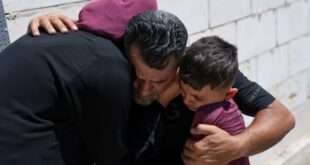'Giant step forward' to save children's lives, says UNICEF

Children in Cameroon will now be able to be vaccinated to protect them from malaria, one of Africa's deadliest diseases.
Of the 249-million malaria cases and more than 600,000 deaths worldwide in 2022, the vast majority were in Africa, according to the World Health Organization (WHO). Children under five are among those at highest risk.
On Monday, the world's first malaria vaccine, known as RTS,S, started to roll out for routine immunizations in Africa following its approval by WHO in 2021. Pilots for the vaccine happened in Ghana, Malawi and Kenya.
"This is a giant step forward in our collective efforts to save children's lives and to reduce the burden of malaria," Andrew Jones, principal advisor in UNICEF Supply Division's Vaccine Centre said in a media briefing from Copenhagen.
Cameroon's babies and other children under five are up first to receive the immunizations.
"It has been an excitement throughout the community that finally we have another tool that we can fight malaria," said Mbianke Livancliff of Value Health Africa in Yaounde.

U.S. reports 1st ‘domestically acquired’ malaria cases in 20 years
7 months ago
The U.S. has reported ‘domestically acquired’ cases of malaria for the first time in 20 years, and experts say the disease could become more common because of climate change.
Dr. Dorothy Achu, WHO's team lead for tropical and vector-borne diseases in the Regional Office for Africa in Brazzaville, Republic of Congo, said malaria cases in Africa are declining but continue to be higher than before the COVID-19 pandemic — a reflection of public health not fully recovering from service disruptions.
"In the malaria community we always say we do not have any magic bullet," Achu said.
That's why immunization campaigns alone won't be enough to stop epidemics, and measures such as insecticide-treated bednets also need to continue, physicians say.
John Johnson, a vaccine and epidemic response expert with Doctors without Borders in Paris, said malaria is the No. 1 illness his group treats in all its programs.
Johnson called the rollout big news, noting RTS,S is the first vaccine against a parasite.
But Johnson also cautioned that uptake of the three required doses could be a challenge given the low vaccination rates for routine childhood immunizations against measles, yellow fever and other illnesses.
"I think it's going to take a lot of support and guidance and hard work from countries and partners to ensure that it's successful," said Johnson, a nurse practitioner who is not involved in the campaign.
Public health experts say a second approved malaria vaccine, R21/Matrix-M, developed by Oxford University with help from the Serum Institute of India, is also expected to roll out in Africa later this year.
Vaccine supplies and cost are other considerations.
Both RTS,S and R21 work against the falciparum form of the malaria parasite, which is common on the continent of Africa.
ABOUT THE AUTHOR

Journalist
Amina Zafar covers medical sciences and health topics, including infectious diseases, for CBC News. She holds an undergraduate degree in environmental science and a master's in journalism.
With files from CBC's Tashauna Reid
*****
Credit belongs to : www.cbc.ca
 MaharlikaNews | Canada Leading Online Filipino Newspaper Portal The No. 1 most engaged information website for Filipino – Canadian in Canada. MaharlikaNews.com received almost a quarter a million visitors in 2020.
MaharlikaNews | Canada Leading Online Filipino Newspaper Portal The No. 1 most engaged information website for Filipino – Canadian in Canada. MaharlikaNews.com received almost a quarter a million visitors in 2020.







